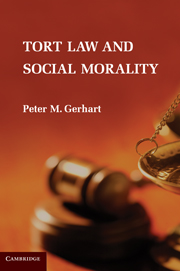Book contents
- Frontmatter
- Contents
- Preface
- Acknowledgments
- PART I OTHER-REGARDING BEHAVIOR
- PART II THE NORMATIVE JUSTIFICATION
- PART III THE THEORY APPLIED
- 6 Social Cohesion and Autonomy: The Justificational Boundary of Duty
- 7 Social Cohesion and Moral Agency: The Justification for Proximate Cause
- 8 Social Cohesion and Strict Liability
- 9 Using Another's Property
- 10 Product Liability: Social Cohesion and Agency Relationships
- 11 Customer-Centered Enterprise Liability
- 12 Social Cohesion and Knowledge: The Intentional Torts
- PART IV SUMMARY AND IMPLICATIONS
- Index
11 - Customer-Centered Enterprise Liability
Published online by Cambridge University Press: 04 August 2010
- Frontmatter
- Contents
- Preface
- Acknowledgments
- PART I OTHER-REGARDING BEHAVIOR
- PART II THE NORMATIVE JUSTIFICATION
- PART III THE THEORY APPLIED
- 6 Social Cohesion and Autonomy: The Justificational Boundary of Duty
- 7 Social Cohesion and Moral Agency: The Justification for Proximate Cause
- 8 Social Cohesion and Strict Liability
- 9 Using Another's Property
- 10 Product Liability: Social Cohesion and Agency Relationships
- 11 Customer-Centered Enterprise Liability
- 12 Social Cohesion and Knowledge: The Intentional Torts
- PART IV SUMMARY AND IMPLICATIONS
- Index
Summary
Thus far, I have claimed that none of the justifications usually given for various manifestations of strict or enterprise liability are superior to the theory of other-regarding behavior as a justification for the level of responsibility courts impose. Another class of cases is sometimes given as an example of strict or enterprise liability that I have not accounted for: cases in which enterprises reasonably impose harms on some customers for the benefit of all customers but courts nonetheless impose a duty to repair the harm (even though the enterprise has acted reasonably). Two cases are representative. In Lubin v. Iowa City, the city waterworks consciously decided not to inspect or replace pipes in the ground because the cost of inspection would have been too great. The location of any defect in the pipe was unpredictable, the cost of inspecting the length of the pipe was high, and inspection could not always disclose where repairs were needed. As a result, the waterworks knowingly and reasonably ignored the risk of burst pipes, allowing the costs to fall on the people where the pipes did in fact burst. They were found liable for the harm thus inflicted, even though their inspection policy was reasonable.
Similarly, McDonald's kept the heat of its coffee high, knowing that the high temperature would increase the harm from accidental spills. They did this because they felt that they would lose substantial customer goodwill if they turned down the heat of the coffee.
- Type
- Chapter
- Information
- Tort Law and Social Morality , pp. 214 - 225Publisher: Cambridge University PressPrint publication year: 2010



